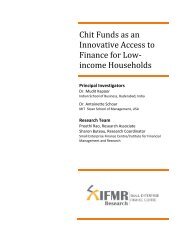Government of India Volume I: Analysis and Recommendations
Government of India Volume I: Analysis and Recommendations
Government of India Volume I: Analysis and Recommendations
Create successful ePaper yourself
Turn your PDF publications into a flip-book with our unique Google optimized e-Paper software.
THE TASKS OF FINANCIAL LAW<br />
2.5. Ownership neutrality <strong>and</strong> competition<br />
The <strong>India</strong>n financial system has an array <strong>of</strong> firms: co-operatives, private <strong>India</strong>n firms, foreign<br />
firms <strong>and</strong> public sector firms. The Commission envisages a regulatory framework<br />
where governance st<strong>and</strong>ards for regulated entities will not depend on the form <strong>of</strong> organisation<br />
<strong>of</strong> the financial firm or its ownership structure. This will yield ‘competitive neutrality’.<br />
In this framework, the regulatory treatment <strong>of</strong> companies, co-operatives <strong>and</strong> partnerships;<br />
public <strong>and</strong> private financial firms; <strong>and</strong> domestic <strong>and</strong> foreign firms, will be identical.<br />
2.5.1. Treatment <strong>of</strong> foreign firms<br />
Whether or not, or the extent to which, participation by foreign firms should be allowed<br />
in the financial sector is a policy matter to be determined by the <strong>Government</strong>. However,<br />
once a decision to allow foreign participation in a particular financial market has been<br />
made, there should be consistency in the regulatory treatment <strong>of</strong> foreign <strong>and</strong> domestic<br />
participants performing similar functions or undertaking similar risks in the market.<br />
For example, if the foreign investment policy for a particular sector permits wholly<br />
owned foreign subsidiaries, the regulator must ensure that the net worth requirements,<br />
capital adequacy norms, investment limits <strong>and</strong> all other regulatory interventions should<br />
be the same for foreign subsidiaries <strong>and</strong> domestically owned firms.<br />
Hence, the Commission recommends, under the capital controls framework <strong>of</strong> the<br />
draft Code, that subject to control restrictions as prescribed, there should be full national<br />
treatment for foreign firms.<br />
2.5.2. Public sector financial institutions<br />
The future <strong>of</strong> public sector financial firms is an important policy question which will shape<br />
the contours <strong>of</strong> <strong>India</strong>n finance. In coming decades, public sector financial firms are likely<br />
to continue to be with us. The Commission has therefore identified three elements in the<br />
treatment <strong>of</strong> these firms:<br />
1. Public sector financial firms require effective regulation <strong>and</strong> supervision. If there are problems<br />
with these firms, they impose costs upon the exchequer. Improvements in regulation <strong>and</strong> supervision<br />
will reduce the potential problems faced with public sector ownership.<br />
2. At the same time, the draft Code emphasises the principles <strong>of</strong> equal treatment <strong>and</strong> a pro-competitive<br />
environment.<br />
3. To the extent that competition concerns in the financial sector arise on account <strong>of</strong> existing laws<br />
that confer special privileges on state-owned enterprises, the Commission recommends amendments<br />
to the laws to create a level playing field between regulated entities, irrespective <strong>of</strong> their<br />
ownership structure.<br />
The goal <strong>of</strong> achieving competitive neutrality in the financial sector necessarily involves<br />
a rethinking <strong>of</strong> laws such as the State Bank <strong>of</strong> <strong>India</strong> Act, 1955 <strong>and</strong> the Life Insurance<br />
Corporation Act, 1956, that were enacted to create specific financial institutions. These<br />
laws contain provisions that vary or exclude the applicability <strong>of</strong> general corporate <strong>and</strong><br />
financial laws to the institutions created under them. They also confer special privileges<br />
as seen in the case <strong>of</strong> the explicit <strong>Government</strong> guarantee under the Life Insurance Corporation<br />
Act, 1956, for all sums assured under LIC policies. The existence <strong>of</strong> such a provision<br />
in the law despite the entry <strong>of</strong> private insurers in the market induces an unfair competitive<br />
advantage in favour <strong>of</strong> LIC as many customers would tend to choose its policies over<br />
those <strong>of</strong>fered by private insurers on account <strong>of</strong> the <strong>Government</strong> guarantee.<br />
The Commission therefore recommends the repeal or large scale amendment <strong>of</strong> all<br />
special legislations that (a) establish statutory financial institutions; or (b) lay down specific<br />
provisions to govern any aspect <strong>of</strong> the operation or functioning <strong>of</strong> public sector financial<br />
institutions (see Table 2.1). The undertakings <strong>of</strong> all statutory institutions should<br />
FINANCIAL SECTOR LEGISLATIVE REFORMS COMMISSION 17



